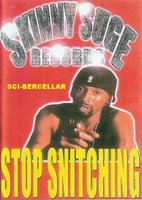 a dvd entitled “stop snitching” features armed men threatening those who would roll over on others as police informants (e.g., “we got a lot of rats up here we wanna expose … it ain’t too many of ‘em, cause we deal with them”). stop snitching dvds and t-shirts quickly fanned outward from baltimore to pittsburgh, boston and elsewhere, fueled in part by the appearance of basketball player carmelo anthony in the video and entrepreneurs publicizing the phenomenon with sites such as stopsnitching.com.
a dvd entitled “stop snitching” features armed men threatening those who would roll over on others as police informants (e.g., “we got a lot of rats up here we wanna expose … it ain’t too many of ‘em, cause we deal with them”). stop snitching dvds and t-shirts quickly fanned outward from baltimore to pittsburgh, boston and elsewhere, fueled in part by the appearance of basketball player carmelo anthony in the video and entrepreneurs publicizing the phenomenon with sites such as stopsnitching.com.
i haven’t seen any t-shirts in the midwest, but the dvd has been a very hot topic on the east coast for the past year. in fact, the baltimore police even put together a short video response to stop snitching, titled keep talking.
volokh reports on the constitutionality of seizing stop snitching t-shirts and the ejection from courtrooms of those wearing them. the story also raises sociological questions about the use of informants, police-community relations, and violence as “self-help.” the phenomenon seems to be driven in part by law enforcement practices that rely increasingly on the use of informants. as the police have upped the pressure on informants, the “inform-ees” have applied countervailing pressure: violence and the threat of violence.
so, what’s the solution? large-scale use of snitches can be divisive to a community and jailhouse informants are notoriously inaccurate. still, witness intimidation and “street Justice” can be absolutely debilitating (in iraq as in baltimore). with regard to the video’s popularity, it has clearly tapped into the strained relationships between young african american men and law enforcement, as well as the continuing popularity of thug iconography.
on the latter point, i was struck by a recent picture of mr. anthony posing in what appeared to be his home office. he had distanced himself from stop snitching, saying: “I’m completely against violence and drugs — that’s not me… I’ve lost friends to violence. I would never support anybody harming anyone… I just want to help.” fair enough for the nba role model, but his role models appear to be a little more comfortable with violence. anthony was seated before two enormous framed mugshot portraits of john gotti and al capone. the photo was a mirror image of former madison police chief david couper’s office. couper, a minnesota sociology ph.d., had large posters of mahatma gandhi and martin luther king in his office. leave it to a madison cop to spruce up the office with the iconography of non-violence.

Comments